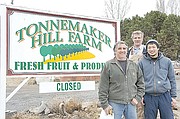Quake isn't stopping next JATP group
MOSES LAKE - Last week's earthquake and tsunami in Japan isn't
stopping the next group of Japanese Agricultural Training Program
(JATP) students from coming to the U.S.
A total of 49 trainees are due to arrive in the US on Thursday,
said Doug Sly, executive director of the Big Bend Community College
Foundation.
There are 50 students in the group, which means only one student
won't be accompanying them, he said.
MOSES LAKE - Last week's earthquake and tsunami in Japan isn't stopping the next group of Japanese Agricultural Training Program (JATP) students from coming to the U.S.
A total of 49 trainees are due to arrive in the US on Thursday, said Doug Sly, executive director of the Big Bend Community College Foundation.
There are 50 students in the group, which means only one student won't be accompanying them, he said.
The one student remaining in Japan lives in the region close to the country's nuclear plants.
It's unclear if his family will be evacuated, Sly explained.
The student still might be able to come over at another time. He remains committed to attending the program and is trying to make it to America.
"I think it's incredible," Sly said. "Despite the hardships in that country, probably all 50 trainees will be here at Big Bend and at the host farms. We didn't know if they were going to delay, or cancel, or get to Tokyo to depart."
Japan's magnitude 8.9 earthquake is believed to have killed 6,911 people, with an additional 10,692 people missing, according to media sources.
The bond between former trainees and their host families is strong, maybe even stronger than the relationship between exchange students and their families, said Sly.
"They work with you every day instead of going to school," he said. "They try to learn American farming practices. Depending on where they're located, they attend college classes. They get to know the families and the kids really well over the years."
Sly found that former trainees return to the US to visit, sometimes on their honeymoons.
"It is a very close personal program and it has been all these years," Sly commented. "Other people have noticed how tight there is a relationship between the host families and trainees."
During the 45 year duration of the program, nearly 5,000 trainees have taken part.
In his talks with people from Moses Lake's sister city of Yonezawa, he's hearing about refugees from other parts of Japan coming to Yonezawa because the damage isn't as severe.
But the lack of fuel in Japan is making it difficult to travel, he pointed out.
People haven't yet donated to a fund through the college foundation for former trainees impacted by the disasters.
"We're just receiving a lot of inquiries," he said.
For more information, contact Sly at 509-793-2004, or via e-mail, dougs@bigbend.edu or foundation@bigbend.edu.





